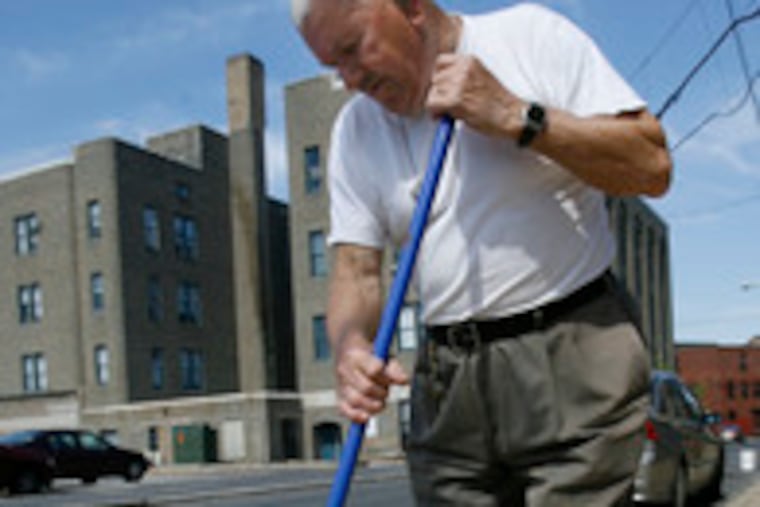Trash-talking rates apology from La.
Trash is trash, and whether it's garbage-littered streets or talking badly about someone else, it still has to be cleaned up.

Trash is trash, and whether it's garbage-littered streets or talking badly about someone else, it still has to be cleaned up.
Philadelphians yesterday handled the former and New Orleans Mayor Ray Nagin the latter, apologizing to Mayor Street for dissing Philadelphia as being dirtier than the Crescent City "by a long shot."
Street's office confirmed that Nagin called Sunday night to apologize, saying he had not intended to criticize or be disrespectful of Philadelphia officials hosting his tour.
Referring to his remarks about Philadelphia's problem with trash and litter, Nagin said in a statement issued yesterday that he was speaking to a New Orleans community group Saturday and, "in an effort to reassure the citizens of New Orleans of the progress being made in our recovery, I pointed to an area in which many American cities struggle but which we are achieving some success."
"I intended no disrespect to the city of Philadelphia," Nagin's statement said. "We are truly thankful for the generosity of our hosts and look forward to a long, positive working relationship between our cities."
That was different from his remarks Saturday, in which he was quoted by reporters as saying: "Let me tell you something. You ought to go to Philly and you will appreciate how clean New Orleans is. . . . We still have some work to do, but we definitely beat them by a long shot."
Yesterday, Philadelphia officials minimized the impact of Nagin's remarks, describing the incident as overblown.
"We've moved on," said mayoral spokesman Joe Grace.
News reports of Nagin's comments in New Orleans initially surprised officials because, they said, he had been completely laudatory of Philadelphia on Thursday, when he toured the city. Nagin had praised the city's Neighborhood Transformation Initiative, in which dilapidated buildings have been razed and the lots seeded and planted to prevent the spread of blight.
According to the itinerary of the tour by Nagin and other New Orleans officials released by Street's office, Nagin viewed at least 30 sites in Northern Liberties, North Philadelphia on both sides of Broad Street, the Girard Avenue Corridor between 18th and 33d Streets, and parts of Brewerytown and West Philadelphia.
It was not clear, however, whether Nagin's comments were the result of general observations of trash or specific sites.
City officials suggested that, because Thursday's tour followed the heavy winds and rain of the nor'easter, the streets might have contained more than the usual amount of trash.
A tour yesterday of some of the sites Nagin visited in Northern Liberties, North Philadelphia and the Girard Avenue Corridor did not show any unusual amounts of trash. On the other hand, since Thursday the warm weather has brought many people outdoors to begin a delayed spring cleanup.
Philadelphians seemed divided about Nagin's comments. On several Philadelphia Internet blogs, some blasted Nagin for being ungrateful and rude to a city that had immediately volunteered to house more than 1,000 people flooded out of their homes after Hurricane Katrina caused so much destruction in 2005. Others agreed with Nagin, writing that Philadelphians continue to blithely dispose of trash by throwing it on the street.
"He thinks this is bad?" asked Joe Carpenter, 46, a union carpenter who stopped while bicycling on Ginnodo Street, a block from the intersection of 18th Street and Girard and Ridge Avenues. "He should have seen the way it used to be. This is Fairmount, this whole neighborhood is coming up."
Carpenter, who said he has lived in the neighborhood 37 years, said he knows of no illegal dumping in the area. Most of the trash is litter that blows around the city, often after being spilled on trash collection day.
"One thing that has hurt us is that we now only get trash collection once a week," he added.
Over in Northern Liberties, 82-year-old Wasyl Tanczak agreed as he swept the sidewalk in front of his rowhouse in the 100 block of Wildey Street.
"I don't have a problem with trash here," he said.
Tanczak's son, William, said the neighborhood was probably the cleanest it had been in the 30 years they had lived there.
Although some neighbors have complained about construction debris left by the crop of new condominiums rising in Northern Liberties, Tanczak said the developers have improved the situation because they prevent illegal dumping by fencing off construction sites and providing security.
"Germantown [Avenue] used to be the garbage dump," Tanczak added.
Officials of the Center City District, which has 64 uniformed personnel sweeping Center City streets seven days a week, did not comment on Nagin's remarks but cited the results of a poll in the most recent State of Center City Report.
The poll of 6,946 commercial and residential property owners and their tenants, conducted earlier this year and supplemented by 958 sidewalk surveys and 3,880 online responses, showed that 86 percent thought that cleaning crews worked hard and 84 percent thought that they were very visible. Seventy-eight percent said the sidewalks were thoroughly cleaned and 70 percent said Center City sidewalks were "clean or very clean."
Philadelphia, dirty or not? Send us photos of your view of the city as either a clean or dirty place, or both, to http://go.philly.com/dirtyornot
EndText